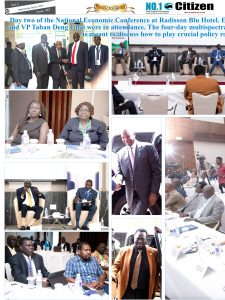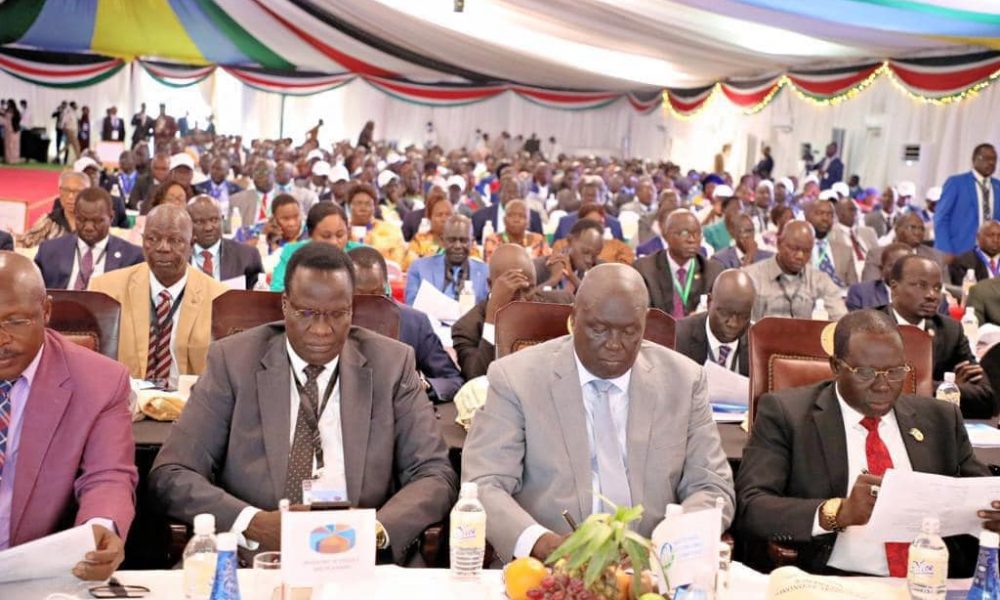By William Madouk
A plenary discussion on the second day of the ongoing National Economic Conference was dominated by how the Bank of South Sudan (BoSS) could stabilize prices in the market.
It all sparked off when Central Bank governor, Johnny Ohisa presented on the role of the BoSS in stabilizing prices and maintaining sustainable economic growth,
Mr. Ohisa said that though his docket is on the path of soothing prices, it faces challenges due to legal framework to supervise and regulate financial entities and insurance firms.
However, the BoSS governor was quick to note that an amended draft bill is currently before the parliament.
According to the BoSS governor, the intuition gears to regulating interest rates and hard currency reserves in order to calm down prices.
“By setting interest rates, reserve requirements, and other policies, BoSS aims to stabilize prices and ensure price stability over the long term,” Ohisa said.
Mr. Ohisa predicts the economic situation in the country, conducive to sustainable growth.
“A stable and predictable inflation environment gives us confidence, encourages investment, and supports sustainable economic growth,” he continued.
The governor added that BoSS has a sole monopoly on issuing the local currency, the South Sudanese Pound (SSP).
He said the institution also monitors currency circulation to maintain its stability and integrity, which is crucial for note stability.
“Stable currency also promotes trade, attracts foreign investment, and supports sustainable economic growth,” he noted.
However, the Minister of Higher Education, Gabriel Changson Chang said to stabilize prices and exchange rates, the economy must be diversified to obtain more hard currency.
“If we talk about price stability and exchange rate, we have to look outside the box; we would want our central bank to utilize the resources of the commercial banks,” Chang said.
He observed that to stabilize the economy, the resources of the commercial banks have to be utilized.
“To do the following, one is to stabilize the prices by doing what? By investing in food production instead of importing food items and other small things, we can do it here,” he added.
Mr. Chang noted that building materials could still be exported, as the country has not yet embarked on industrialization.
“But we can use our resources by financing poultry and producing food staff all over the country, that is the one area that will make our market stable,” he advised.
According to Mr. Chang, BoSS should also look for export items that will bring in foreign exchange.
“These cash exchange goods include Gum-Africa, season seeds, and the commercialization of huge livestock,” he observed.
Meanwhile, ex-governor of BoSS, Othom Rago cautioned against roadside forex vendors, saying some are peculiar to trade hard currency.
“If there is a forex bureau, the central bank has to see those who stand on the roads having the latest issued currency, which is only found in the central bank; how comes that these vendors on the roads sell pounds with hard currency?” he questioned.
According to Mr. Rago, the hyperinflation in the country was caused by the harmonization of the exchange rate with that of the parallel market.
“With the existing inflation all over the country, we have seen that the central bank has merged the exchange rate between the black market and BoSS. Who is chasing who now in this situation?” he queries.
The former governor explained the attempts made by the Central Bank to pull down inflation in a frolic fight against the black market.
“Because, if the rate is going up and we try to catch up with the black market, this is reflecting on the prices of goods. If you go to Konyo-Konyo, there are plenty of goods, but the prices are high because of this exchange rate,” he noted.






